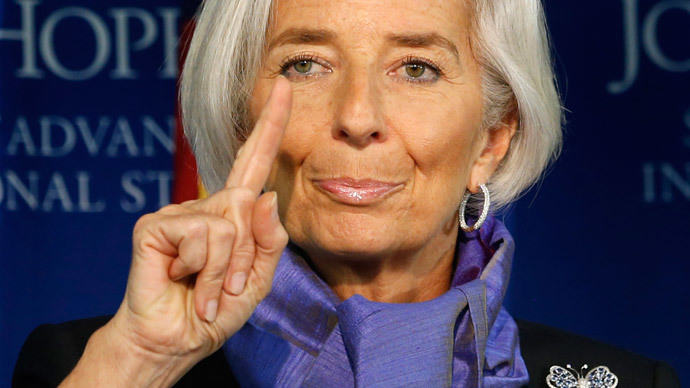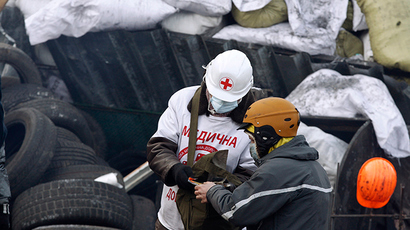Ukraine ‘spillover’ could wreck world economy - Lagarde

International Monetary Fund (IMF) managing director Christine Lagarde warns the Ukraine situation could have “broader spillover implications” if it is mismanaged.
Ukraine’s ailing economy, combined with fresh geopolitical tension in Crimea and now US-led sanctions against Russia, have Lagarde worried the consequences won’t be contained regionally, but could have an effect on the global economy.
“The situation in Ukraine is one which, if not well managed, could have broader spillover implications,” Lagarde said in an address to Johns Hopkins University students ahead of the IMF's spring meeting.
The IMF head said before Russia issued Ukraine a $3 billion loan, the economy was "heading for disaster", she said in an interview with PBS on Wednesday.
"Without the support that they [Ukraine] were getting from this lifeline that Russia had extended a few months ago, they were heading nowhere," LaGarde said.
Ukraine’s economy is forecast to contract 3 percent in 2014 as it recovers from a tumultuous year which has nearly wiped out its Eurobond market, currency, and national reserves. Inflation is expected to continue to rise, with the IMF predicting 12 percent in 2014.
In 2013, the government predicted 3.4 percent growth, but the economy showed zero percent growth.
IMF help
The Washington-based institution agreed on March 26 to lend Ukraine between $14 billion and $18 billion to help avoid a default. Overall, Ukraine will receive $27 billion from various international aid outlets, according to Nikolay Georgiev, the head of Ukraine’s IMF mission.
The World Bank is also considering the possibility of providing Ukraine with $1 to $3 billion. Canada, Japan and Poland are also contemplating financial aid.
Before the IMF money came through, rating agencies like Standard & Poor said Ukraine would default by the end of 2014.
When the funds will become available to Ukraine and how much will be doled out remains to be seen.
Since January, the Ukrainian hryvnia has depreciated 27 percent, and Ukraine’s Central Bank has spent billions on currency interventions, trying to stave off depreciation of the hryvnia, which has left the country's treasury high and dry.
The IMF and the Central Bank have agreed on a fully flexible exchange rate, which means the hryvnia will lose more this year, and may weaken to 12.50 by the end of the year, according to a Royal Bank of Scotland estimate. On Wednesday the hryvnia traded at 11.3 to the dollar.
The IMF will prepare a package of economic reforms, some which may be painful for Ukrainians. Lenders will insist on cutting gas subsidies, which could send gas bills soaring more than 50 percent, and an austerity program will freeze salaries, introduce new income taxes, as well as pension payment cuts.
Ousted President Viktor Yanukovich rejected an IMF bailout last August fearing conditions would be too harsh for Ukraine’s decrepit economy.
'Low growth trap'
The overall global growth estimate for 2014 has been increased by the World Bank to 3.2 percent, and Christine Lagarde cautioned that the global economy could be heading to a prolonged period of “sub-par growth”. Important to growth in 2014 will be the recovery of the eurozone, Lagarde said.
After a continent-wide economic crisis, recovery seems to be on the horizon, but is very fragile. Inflation in the eurozone is still dangerously teetering towards deflation, which has caused the European Central Bank to consider taking unorthodox measures to stimulate the economy, including quantitative easing which helped the US exit recession.
European Central Bank policymakers meet on Thursday in Frankfurt with comments by bank chief Mario Draghi to follow.
Lagarde supported this controversial monetary policy in her address on Wednesday, as she advocated for "more monetary easing, including through unconventional measures".
EU inflation is currently at half the 2 percent target. Lagarde previously warned low inflation could derail euro zone recovery.
The IMF was created after World War II by the Bretton Woods agreement to provide money to troubled governments to pay their debts, and now has 188 members.














